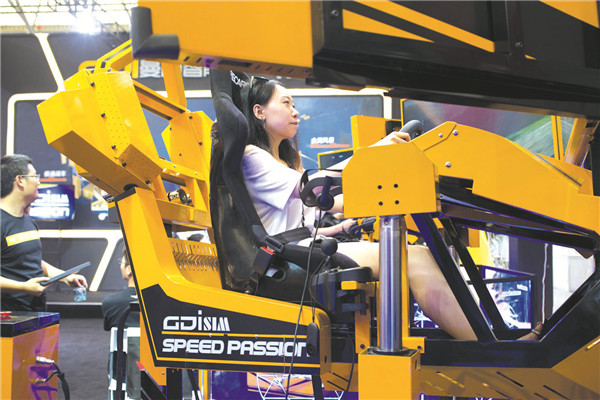News&Insights
- The power of play: Toymaker Pop Mart debuts on Hong Kong market
- Beauty skin deep, and pockets lined
- Crackdown on excess wrapping in parcel delivery industry to start soon
- Ready-to-eat meals a niche for big-name restaurants
- Consumption upgrade bringing new boon to top-end rice producers
- Arrow sews up 10-year expansion plan
- Chain operations buck trend to expand
ASK AND QUESTION
Lawyers Article
One for all, in the name of fun
Source: franchise lawyer network Author: Beijing lawyers Time: 2016-10-20
Movie companies are no longer just making films and game developers no longer just want to design new games — the key to success these days lies in the diversification of content across entertainment sectors
 |
|
Visitors try out virtual reality games by Guangzhou-based company NineD during the China Joy convention. The Chinese gaming market is now estimated to be as large as the one in the US. Photos by Gao Erqiang / China Daily |
The blurring of boundaries between gaming and other sources of entertainment such as Internet portals, social networks and films was the most prominent phenomenon at this year’s China Joy, the annual gaming and digital entertainment extravaganza in Shanghai.
Held at the Shanghai New International Expo Center from July 28 to 31, the event this year drew 325,500 visitors, an increase of 19 percent from last year. The burgeoning crowd numbers also reflect the growth of the gaming industry in China — according to the China Gaming Industry Report which was released at the China Digital Entertainment Expo and Conference, an event that is part of China Joy, games developed in China achieved sales of $14.8 billion in 2015, taking up more than 70 percent of the market share.
The domestic gaming industry is also aggressively expanding to overseas markets, growing at a staggering rate of 87.4 percent every year for the past five years. Based on statistics from China’s gaming industry administration, the domestic gaming market had in 2015 hit $21.15 billion. This means China now has a gaming market that is as large as its US counterparts.
Experts said that much of this growth has to do with the diversification of entertainment content.
Huayi Brothers Media Group, one of the largest film and entertainment corporations in China, has been at the forefront of doing so in China. The company entered the Internet entertainment segment six years ago by introducing a slew of Internet games, primarily those for mobile platforms.
It has since followed up on that by creating complementary content in the form of film productions and Internet TV series.
In 2010, Huayi Brothers became the second largest shareholder of Ourpalm Co Ltd, a company that specializes in producing gaming content for smart phones and social networks. This year, Huayi became the second largest shareholder of Yingxiong Entertainment, a mobile game company dedicated to the promotion of e-sports.
Most recently, Huayi Brothers has also gotten involved in the development of Virtual Reality (VR) technology, having launched a VR experience center at the Wangfujing commercial center in Beijing.
 |
|
A woman plays a game at the China Joy convention held in Shanghai from July 28 to 31. |
Wang Zhonglei, deputy president of the media group, said that one of the keys to their success is the “linkage between film and games”, and that the group will also be looking to diversify their offerings further with theme parks and merchandize.
“All these companies under our group have shown great profitability and this is due to how the new companies have managed to join hands with Huayi to generate new intellectual property (IP) through the linkage between film and games,” said Wang.
“At Huayi Brothers, we have a firm belief that quality content must be at the very root and core of our business,” he added.
The recent Warcraft movie is one such example of the current trend of expanding content across different platforms. The movie, produced by Legendary Entertainment and American gaming giant Blizzard Entertainment, is based on the Warcraft video game series and novels. Though it is widely considered a flop in the US, Warcraft is actually the third best-selling film in China’s box office in 2016 with takings of $221 million.
Tencent, one of China’s largest Internet companies which is renowned for its social networking services, was among the investors of the production.
“Tencent participated in the Warcraft movie not only for commercial profit. We had explored having a cross-industry entertainment IP and realized that there can be a successful cross-over between entertainment industries,” said Gao Li, vice president of the games department at Tencent, who added that this collaborative experience will prove very valuable for more of such projects in the future.
Gao also said at the China Digital Entertainment Expo and Conference that Tencent’s literature section has made “the largest IP output” in the industry, with a large number of successful films and TV series having been produced from original novels shared on the Tencent literature platform. She added that the company has also made great efforts to protect the copyright of the content in order to improve the chain of production and nurture a healthy ecosystem.
Cross-sector examples
Another example of how gaming content is being expanded into other platforms is Crossfire, a tactical first-person shooter developed by SmileGate, which has been working with Tencent to promote its games since 2007.
According to SmileGate, Crossfire has been played by 650 million players worldwide and the game’s IP value is estimated to be $1.5 billion. The company has also held global championships of the game, with the national tournament in China scheduled to take place later this year in Suzhou of Jiangsu province.
The South Korean gaming company had announced its new plans for Crossfire during China Joy, revealing that it is working with Tencent and other partners to develop a smart phone version of the game and has plans to create a 40-episode TV series, together with Chinese entertainment companies, based on the game.
“It will be a big budget production featuring iconic Korean idols, military elements and youthful charm. The company is determined to make Crossfire a cultural brand with more spin-off content and merchandize,” said Ina Jang, general manager of the entertainment department of SmileGate Group.
At this year’s Cybertron Con, a convention for Transformers fans and collectors which was a part of China Joy, San Francisco-based game company Kabam also raised eyebrows and left tongues wagging by announcing its plans to launch a Transformers-inspired multiplayer mobile game in the first quarter of 2017.
The fifth installment of the film franchise, titled Transformers: The Last Knight, is scheduled to hit cinemas worldwide in June next year. Kevin Chou, CEO of Kabam, said that the new Transformers game will feature high-definition visual presentation as well as smooth gameplay on the 3G and 4G mobile networks.
“Kabam is a leader in developing mobile games inspired by popular franchises, and its expertise will help us create a game that thrills long-time Transformers fans and newcomers alike,” said Mark Blecher, senior vice president, digital gaming and corporate development at Hasbro, owner of the Transformers franchise.
Kabam, which has worked with Hollywood’s leading film studios to create games based on movies such as The Hobbit: Kingdoms of Middle-earth and Fast & Furious: Legacy, opened its Beijing office in 2011 to tap into the burgeoning Chinese gaming market. It received an investment of $120 million from Alibaba Group in 2014.
The game developer launched its first game in China earlier in May. Titled Marvel Contest of Champions, the free-to-play mobile fighting game pits superheroes from the Marvel world against one another and has achieved global sales of $325 million since its inception in 2014.
A new driving force
While filmmakers have been attempting to expand the reach of their movies by launching games, it is the latter that is the driving force of entertainment now, said Tim Fields, vice president of Kabam.
According to Xie Enwei, head of the Chinese team of Microsoft Xbox, Quantum Break, a video game published by Microsoft this year, is a good example of that.
“It’s a game and a movie at the same time,” said Xie.
“The storyline and characters in the game and the film come together seamlessly.” In the game, four episodes of the story will unfold and it will feature real characters played by actors such as Shawn Ashmore and Aiden Gillen.
Xie added that developing a game alone is not sustainable in today’s entertainment climate, and that industry players can look to success stories such as the Halo game franchise on Microsoft’s Xbox console for inspiration. The game has since its inception in 2001 been turned into animation series, films, novels and merchandize, and is still going strong. The next installment of the game, titled Halo Wars 2, will be available on the Xbox One console in early 2017.
The China finals of the Halo World Championship 2016 took place at the Xbox pavilion during China Joy. The winner of the global competition will take home a whopping $2.5 million in prize money.
Microsoft’s Xbox console has been playing an integral role in helping Chinese game developers tap into the overseas markets. More than 700 Chinese studios have joined the Xbox games platform and earlier this year, 18 new games from China had an experimental showcase in the US.
zhangkun@chinadaily.com.cn

 京公网安备:
京公网安备:
